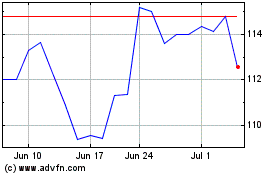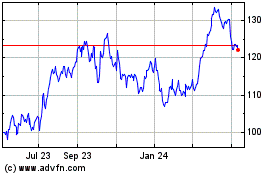House Plans Vote on Bill to Lift Ban on Oil Exports
September 15 2015 - 12:20PM
Dow Jones News
WASHINGTON—House Republicans plan to vote on a bill in the
coming weeks to lift the nation's four-decade ban on oil exports, a
move expected to reignite debate over what to do with oil from a
boom in domestic production over the past decade.
The vote would please more than a dozen oil companies lobbying
Congress, and if successful, it could rattle global oil markets
facing volatility and lower prices.
House Majority Leader Kevin McCarthy (R., Calif.) is expected to
announce the vote, being scheduled for the last week of September,
at a Tuesday speech in Houston. While the legislation is likely to
pass the GOP-controlled House, its prospects in the Senate are less
clear. The White House hasn't taken a position on the issue.
"If there was ever a time to lift the oil export ban, it's now,"
Mr. McCarthy plans to say in Houston, according to prepared remarks
viewed by The Wall Street Journal. "Lifting the oil export ban will
not only help our economy, it will also bolster our geopolitical
standing."
More than a dozen oil companies—including Continental Resources
Inc., ConocoPhillips Co. and Marathon Oil Corp.—have been pressing
the issue with Congress over the past year. They argue that
allowing unfettered domestic oil exports would eliminate market
distortions, streamline U.S. petroleum production and stimulate the
domestic economy.
Some refineries with business primarily in the U.S. and consumer
interest groups oppose domestic exports, saying they would raise
gasoline prices for U.S. drivers.
Refineries have been exporting refined oil products, like
gasoline and diesel, in record amounts in recent years because the
ban applies only to crude, not products refined from that
crude.
The U.S. Energy Information Administration, the statistical arm
of the Energy Department, said in a report released earlier in
September that lifting the ban wouldn't increase U.S. gasoline
prices and could even help lower them.
House GOP leadership and the chief sponsor of the bill, Rep. Joe
Barton (R., Texas), hope to get nearly all Republican members of
the House and at least 20 Democrats to support the measure. The
White House, which hasn't taken a position on oil exports, may
issue an official statement articulating whether it supports the
bill or not—something the Obama administration often does before
Congress votes on legislation.
Mr. McCarthy is scheduling the vote for the last week of
September, but fights over unrelated spending issues could push the
vote on oil exports by a week or two, according to GOP House aides.
Mr. McCarthy is also expected to announce Tuesday the House plans
to vote on other energy legislation streamlining pipeline
infrastructure and seeking to enhance U.S. energy security.
A Senate panel voted earlier this summer on similar legislation
to lift the oil-export ban, but no Democrats supported the measure.
That bodes poorly for its prospects before the full Senate, should
it come up for a vote at all in the coming weeks.
A spokeswoman for Senate Majority Leader Mitch McConnell (R.,
Ky.), whose office controls the floor schedule in the Senate,
declined to comment. Mr. McConnell hasn't weighed in on the topic
publicly.
Exporting oil was unthinkable to most energy industry experts
until the past couple of years as production increased. Support on
Capitol Hill also has been growing faster than many observers
thought given concern about how exporting oil could, or could be
perceived to, raise gas prices—a politically fraught election
issue.
In response to industry requests, the Obama administration
already has taken some incremental steps to ease the growing glut
of domestically produced oil, which is pumping at a rate of 9.3
million barrels a day—more than 70% higher than five years ago—with
commercial crude stockpiles near all-time highs.
Last year, the Commerce Department began allowing companies to
export ultralight oil after minimal processing, and last month it
said it would begin allowing companies to exchange U.S. crude with
Mexico.
The U.S. is also already exporting more than a half-million
barrels of crude a day to Canada, the biggest exemption under the
ban. That is 14 times as much as in 2007, but still just roughly 5%
of U.S. oil produced a day.
The ban, which Congress put in place in the aftermath of the
1970s Arab oil embargo, is the last remaining part of the export
debate.
--Christian Berthelsen contributed to this article.
Subscribe to WSJ: http://online.wsj.com?mod=djnwires
(END) Dow Jones Newswires
September 15, 2015 12:05 ET (16:05 GMT)
Copyright (c) 2015 Dow Jones & Company, Inc.
ConocoPhillips (NYSE:COP)
Historical Stock Chart
From Mar 2024 to Apr 2024

ConocoPhillips (NYSE:COP)
Historical Stock Chart
From Apr 2023 to Apr 2024
